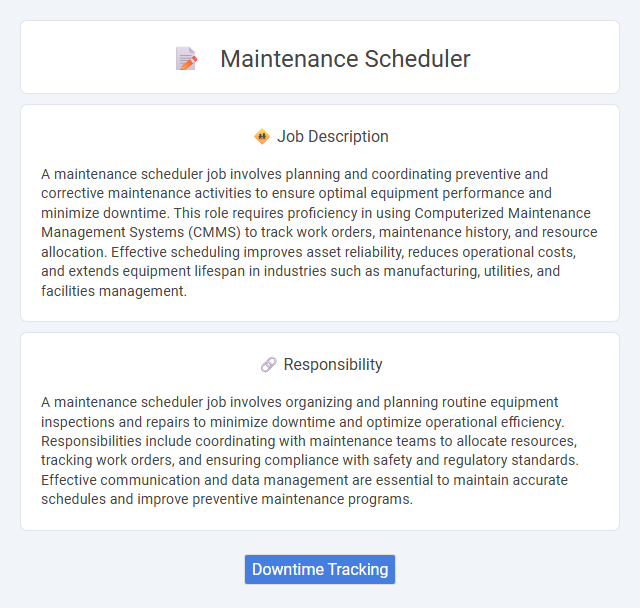
A maintenance scheduler job involves planning and coordinating preventive and corrective maintenance activities to ensure optimal equipment performance and minimize downtime. This role requires proficiency in using Computerized Maintenance Management Systems (CMMS) to track work orders, maintenance history, and resource allocation. Effective scheduling improves asset reliability, reduces operational costs, and extends equipment lifespan in industries such as manufacturing, utilities, and facilities management.
Individuals who are detail-oriented and possess strong organizational skills are likely suitable for a maintenance scheduler job, as this role requires coordinating multiple tasks efficiently. Those with good communication abilities and the capacity to manage time-sensitive maintenance activities may find it easier to handle the responsibilities involved. Conversely, people who struggle with multitasking or prefer less structured environments might face challenges thriving in this position.
Qualification
A Maintenance Scheduler must possess strong organizational skills and experience with Computerized Maintenance Management Systems (CMMS) to efficiently plan and coordinate preventive maintenance activities. Qualifications typically include a background in mechanical or industrial engineering, technical certification, and knowledge of asset management principles. Proficiency in data analysis and effective communication with maintenance teams ensures optimized resource allocation and minimal operational downtime.
Responsibility
A maintenance scheduler job involves organizing and planning routine equipment inspections and repairs to minimize downtime and optimize operational efficiency. Responsibilities include coordinating with maintenance teams to allocate resources, tracking work orders, and ensuring compliance with safety and regulatory standards. Effective communication and data management are essential to maintain accurate schedules and improve preventive maintenance programs.
Benefit
A maintenance scheduler job likely improves operational efficiency by organizing and prioritizing maintenance tasks to minimize downtime. This role probably enhances resource allocation, ensuring that labor and materials are used optimally. It may also contribute to prolonged equipment lifespan through timely preventive maintenance.
Challenge
Maintenance scheduler jobs often face the challenge of balancing equipment availability with minimizing downtime, which requires precise planning and coordination. The probability of unexpected machine failures or urgent repairs can disrupt carefully laid schedules, demanding quick adjustments and effective communication. Managing resource allocation efficiently while adhering to production deadlines likely remains a constant obstacle in this role.
Career Advancement
A Maintenance Scheduler job enhances career advancement by developing expertise in optimizing equipment uptime and resource allocation, critical for operational efficiency in manufacturing and facilities management. Proficiency in computerized maintenance management systems (CMMS) and strong analytical skills positions professionals for leadership roles such as Maintenance Manager or Operations Supervisor. Continuous skill development in predictive maintenance and workflow optimization accelerates progression into strategic planning and asset management domains.
Key Terms
Downtime Tracking
A Maintenance Scheduler job involves meticulously planning and coordinating maintenance activities to minimize equipment downtime and enhance operational efficiency. Downtime tracking is a critical component, requiring real-time monitoring and detailed reporting of machine stoppages to identify patterns and root causes. Effective downtime tracking enables proactive maintenance, reduces unplanned outages, and optimizes asset utilization in manufacturing or production environments.
 kuljobs.com
kuljobs.com